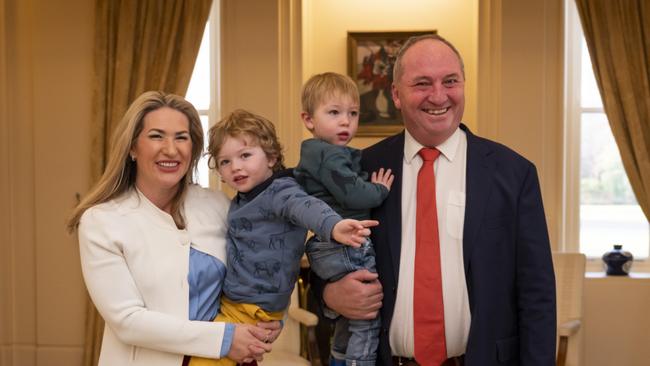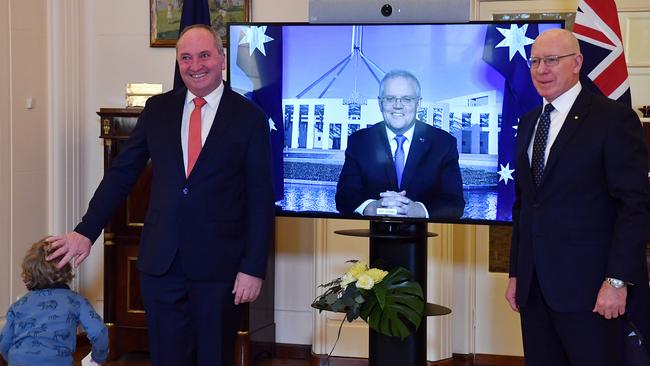Why the return of wacky ‘clown’ Barnaby Joyce scares Labor
Barnaby Joyce is not unintelligent. His preparedness to campaign against political correctness and Chinese influence make him an election wildcard.
There’s no doubt Joyce carries a lot of baggage from his previous term as Nationals leader and, there is potential for enormous damage to the Coalition’s standing within the nine months of when an election must be called.
The Prime Minister – leading a minority government, having to manage a more assertive National Party, having to assuage fearful Liberals, living with a perception he’s got a problem with women and keeping parliament in order – has a massive challenge.
But snap assumptions based on previous performance and popular perceptions can lead to misconceptions and misjudgments about the real result and impact of a change of leadership.
Labor, the Greens, the political commentariat, progressive activists and some Liberals completely misread the last leadership change when Morrison replaced the “popular” Malcolm Turnbull as Liberal leader and prime minister in 2018.
The ALP, under Bill Shorten, assumed the Coalition couldn’t win, pursued a massive agenda to ensure a mandate for change, didn’t seem concerned with trying to undermine the new Prime Minister and accepted two-party-preferred polling showing the opposition in a winning position.
The agenda included bold, and uncosted, targets on reducing greenhouse gas emissions and an exploitation of the “dinosaurs” in the Coalition who were “climate-change deniers” who removed Turnbull.
We know how that ended: Shorten joined Liberal John Hewson as an opposition leader who lost an unlosable election; regional Australia turned on Labor; the anti-coal position cost Shorten support in Queensland and in NSW’s Hunter Valley; the Nationals held every seat, and; the Liberals gained seats in a “hi-vis vest rebellion” against Labor’s anti-resources and high-taxing agenda.

In this context it’s essential for all sides – Liberals, Nationals, Labor, the Greens, One Nation and those planning an independent campaign – to prepare a strategy based on cool assessment before locking into stereotypical, rhetorical plans.
It’s easy to list the disadvantages of Joyce’s ascension: he will destroy the Coalition; he will turn Liberal voters away from Morrison; women don’t like him; he’s “wacky” and a “clown”; he’s a climate dinosaur, and; he brought down a decent leader for personal ambition and revenge.
The advantages are less obvious because they are relevant to electoral results and retaining government, and fit less easily into a popular city-centric narrative.
For a start, the Nationals restored Joyce because they wanted to ensure success at the next election, particularly in Queensland. The previous challenge against Michael McCormack, which was built more on ambition and revenge, failed because the advantage in switching to Joyce was not clear.
Given that, the vote changed on Monday demonstrated some previous McCormack supporters now adopted the view that the Nationals had lost their separate identity, they weren’t viewed as standing up to the Liberals, faced real threats from One Nation and the Shooters and Fishers parties, and were failing in Queensland.
Joyce was never going to win a beauty contest against McCormack but the prospect of losing government is a powerful incentive in a ballot as Joyce says he has “changed” and admitted his faults.
Morrison recognises the inherent danger in having Joyce as his fellow leader of the Coalition. There have been personal tensions between the two, not the least of which was Morrison’s support for Turnbull in helping remove Joyce as deputy prime minister after scandals in his private life.
The biggest policy challenge is allowing the Nationals an assertive conservative position on climate change, particularly on a target of net-zero carbon emissions by 2050, and the flow-on against Liberals in inner-metropolitan seats who fear Joyce will cost them votes.

So far, Morrison has managed a new climate change narrative based on reducing emissions through “technology not taxes” and getting results, not signing up for targets. The Nationals’ demands for “details” on climate change policy that Morrison says is aimed at getting to net-zero emissions “preferably” before 2050 allows room for negotiation.
That’s a test that inevitably involves Liberal MPs’ concerns Joyce will cost them votes because he’s already being described as a “dinosaur” by Labor on climate change and is unpopular with women.
Again, this comes down to a question of demographics and geography: Where and with whom will Joyce’s leadership have the most effect?
For decades it has been clear the person leading the Liberals has a much greater effect on Nationals voters than the Nationals leader has on Liberal voters. John Howard and Tony Abbott were popular Liberal leaders in the bush and boosted National support.
Turnbull was unpopular in the regions and in 2016 it was strong Nationals leadership and an independent campaign that saved the Coalition government, despite the negative impact on National voters. Likewise, in 2019 the Nationals’ vote recovered under Morrison and McCormack and all the seats won under Joyce were held because an unpopular Liberal leader, strongly pursuing an agenda against fossil fuels to cut greenhouse gas emissions, was not there.
Antagonism towards Joyce from female voters is another fear held by Liberal MPs and prosecuted by Albanese, as female Labor MPs asked Joyce about criticisms from Nationals women and so raised his personal history of marital failure and an affair with a staffer, now his partner.
Joyce’s response to the attack is to admit his faults, claim to be able to change and declare he is seeking to be a “better person”. In parliament this week, Joyce also admitted there may be women who didn’t like him but he also conceded there were a few blokes who didn’t like him either.
Again, the incantations about the female vote assume, incorrectly, that women vote as a bloc, and that Joyce has not recognised the danger. The criticisms that the Morrison government has a “problem with women” in the wake of sexual assault and harassment allegations in parliament will be strengthened by Joyce’s leadership.
However, Abbott was always accused of having a problem with women and yet the electoral breakdown showed the conservative Abbott had stronger support among women than the progressive Turnbull.
Joyce obviously has strong support in his electorate of New England among women, and his strident attacks on political correctness gains sympathy from some conservative women.
As for being wacky and a clown, Joyce is not unintelligent and is overwhelmingly acknowledged, including by Labor thinkers, as a great retail politician who can communicate.
A preparedness to enter the culture wars and campaign against political correctness, and stand against Chinese influence, are areas where Joyce has an advantage over McCormack and are a vital opportunity for the Nationals to fend off conservative independents and minor parties.
A True North poll taken on Tuesday showed an overwhelming support for Joyce over McCormack among Nationals voters, 67 to 33 per cent, but also, vitally, level support among Liberals and a narrow advantage with One Nation voters, 52 to 48 per cent.
The electoral threat to the Nationals in the regions is from splinter conservative groups, and Joyce is more attractive to them. As a Nationals hero who defeated Pauline Hanson in one of her tilts at the Senate, Ron Boswell maintains the Nationals need to be able to appeal to conservatives who can be lost to the independents.
This One Nation element is also a key indicator for Labor. Labor’s lost legions in regional areas among blue-collar and hi-vis vest workers is recognised by all, including the Opposition Leader, who tries to balance the interest of regional mine workers with that of the metropolitan voters, and it is here Joyce poses a bigger danger than McCormack.
Of course, Joyce is unpopular with Labor and Greens voters and some Liberals but the job of the Nationals leader is to hold Nationals’ votes, not to lose them to splinter groups and, if possible, pick up the votes of ALP workers.
In the Labor-held NSW electorate of Hunter in the federal election of 2019, and at the state by-election in the Upper Hunter, it is clear the Labor vote has collapsed and the Coalition leadership believes it can take Hunter from Labor for the first time.
But at the 2019 election Labor MP Joel Fitzgibbon almost lost his seat to One Nation, not the Nationals or Liberals, because traditional Labor voters could bring themselves then to vote for another candidate but not the Coalition.
But a Nationals leader seen as interested in working people may just clinch a vital victory for a Coalition government that has to win three or four seats just to retain power.
These are the fundamental reasons why Joyce was elected Nationals leader and he has a lot to live up to to justify yet another leadership change, but he has a better chance than McCormack. Labor, and others, should realise there’s a real threat from this “clown”.


After another week of madness in federal politics and yet another leadership change, with a return to Barnaby Joyce as Deputy Prime Minister, it is easy to be drawn into yet more madness about what it means for Scott Morrison and Anthony Albanese as they head into an election.